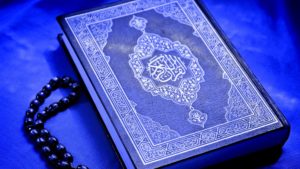Articles
A Varying Comment on Shari’a
Article theme: Islam.
In responding to the centrality of art in the advancement of civilizations, I am at a loss trying to discuss this issue by virtue of my dearth of knowledge in this field. However, as with regard to Islamic Civilization (Note, Civilization not a mere insulated and isolated religion), Calligraphy and Islamic Architecture are forms of art that are and were quite demanding in human’s creative skills and artistic excellence. Not only that, Islamic Architecture and its wide spread centers of specialization proved functionally and environmentally superior to any thing one finds in prevailing modern architecture. However, and as we extol the great virtues of Western art exemplified in paintings and painters of the renaissance and what follows, I am at a loss again to draw convincing conclusions of their general utility and broader impact on the general social benefits other than serving the narrow speculative and collections’ interests of the elites few, and for exhibition in rather museums to enhance the curious knowledge among the very few of the general public. I fail to recognize a single Chinese artist’s name or of a Chinese painting or a sculptor that enhanced China’s amazing current revival. That is, I strongly fail to see the relevance here between the incredible current Chinese general advancement and few individuals’ works of art.
As with regard to the apparent sweeping criticism of what is insinuated as fossilized Islam and Shri’a, I tend to view the approach as being a kind of unjust and exaggerated. With 1.4 billion Moslems adhering to the precepts of current Islamic teaching, Shari’a as a comprehensive compiled and incremental body of jurisprudence touching on each aspect of human life, can not summarily be discounted in the fashion suggested. Shari’a as categorized into different distinct branches with the development of each branch standing at a different level and degree of relevance and completeness to the current age. In the branch of “Dealings,” what’s called in Arabic “Al-Muamalat,” I strongly believe the Shari’a, with the exception of a few snags requiring proper addressing, is SUPERIOR to all that the modern Western endeavors had come with thus far. Central and ever a guiding principle in Shari’a is the drawn utility on a mutual win-win basis and the harmonious reconciliation of the general socio-economic benefit of the individual and the community/society. Viewing the individual as complete (soul, mind and body), stressing the healthy balance in the true definition of a human, is central in the purpose and objective of a Moslem jurisprudence scholar’s initiative to interpret or promulgate a consensual Shari’a initiative. By contrast, the huge disparities plaguing the Western world, including the non-restrained pursuit accumulation of wealth is now obviously causing all kinds of endemic social ills and break in harmony in the Western cultures and societies. The preponderance of the drug culture, alcoholism, high crime rates, broken families under the false guise of Women Rights and Women liberation, same sex marriages, high rates of divorce, stressful existence by reason of easy credit, lack of job security (lack of communal cohesiveness, compassion and empathy in the economic structure of the Western culture), all attest to the soundness of the central motivating purpose of a learned Moslem jurisprudence’s scholar in the cautious construction and interpretation of the Shari’a precepts: i.e. so-called searching and establishing that subtle utilitarian essence “Al-Illa’,” i.e. the ultimate general equitable utility in the advancement of a just and harmonious community/society, that represent the spirit of Al-Shari’a.
Roles and responsibilities
 The sub-branch of “Al-Ahwal Al-Shaksiah,” believe translated into “Family and Personal Affairs,” tackling subjects such as marriage, divorce, children custody, alimony, inheritance, etc, is quite relevant and in my uninformed view is in keeping with advanced laws in the world, however, it expands the supportive roles and responsibilities of the community and family at large in cooperatively assuaging the insecurities of the member individual Moslem. Furthermore, they remain at variance with the much touted Western laws that are increasingly divisive and destructive of families and are rendering women, under the cloak of ever amorphous and ill-defined roles, dysfunctional and delinquent in the performance of their natural roles and duties to insure a stable and harmonious social existence: overlooking the centrality of their role in a family.
The sub-branch of “Al-Ahwal Al-Shaksiah,” believe translated into “Family and Personal Affairs,” tackling subjects such as marriage, divorce, children custody, alimony, inheritance, etc, is quite relevant and in my uninformed view is in keeping with advanced laws in the world, however, it expands the supportive roles and responsibilities of the community and family at large in cooperatively assuaging the insecurities of the member individual Moslem. Furthermore, they remain at variance with the much touted Western laws that are increasingly divisive and destructive of families and are rendering women, under the cloak of ever amorphous and ill-defined roles, dysfunctional and delinquent in the performance of their natural roles and duties to insure a stable and harmonious social existence: overlooking the centrality of their role in a family.
As to the other major branch of Shari’a, “Al-Ibadat,” translated as “Performance of Religious Rituals,” and with the exception of one theocratic Moslem state among the score of the other Islamic states that are liberal, the adherence to the precepts of this branch is left to the individual, and performance of the rituals remains mostly a private matter left to the individual to observe and pursue. Nearly, non-existent the intervention of the state, the clergy or any Moslem institution in the personal life of an individual on this count. The individual’s accountability in this regard is left strictly between the individual and God without the interference of any third parties.
The third major branch, “Al-Rohaniyat,” i.e. “Spirituality,” again considered, by their very abstract and esoteric nature, preserve and responsibility of the individual to interpret and pursue.
My understanding is that the “Gates” for “Ijtihad,” i.e. advancing differing, complementary or additional interpretations to the Shari’a are quite ajar with the caveat that be undertaken by a learned Islamic scholar in order to establish wider relevance and ultimate authority. The Islamic world is thrive with Moslem scholars of worldly and philosophical leanings who venture into these domains, including names such as “Mohammad Arkoun,” Abdallah Al-Arawi,” “Mohammad Abed El-Jabri,” “Fatmah El-Marnisi,” “Hisham El-Eat,” “Mohammad Shahrour,” and many, many others who are continuously enliven the debate on the Shari’a as the Islamic Jurisprudence.
By this token, Nothing whatsoever precludes an independent Moslem thinker of presenting his/her theses in contestation of exegeses found that are not in compliance with proven theories of true worldly socio-economic relevance and that are of general utilitarian and spiritual growth benefit and the general (rather than the narrow)well being of the individual and the community.
Naturally, establishing Scholarly consensus and succeeding in the ultimate inclusion or modifications to the existing relevant rulings in the body of Al-Shari’a, as with all laws, is more procedural and is arduous.
The calling for a Martin Luther to deliver Moslems from the existing Shari’a is not relevant neither applicable in the Islamic case. No hierarchy or an overwhelming despotic abusive structure as the Papacy at the time of Luther exists in Islam that justifies such a cry. In lieu of that cry, I would second encouragement of the independence of the Moslem jurisprudence scholars and clergy (Sheikhs) from the coerced dependence and authority of the temporal powers in place that in turn greatly compromises the interpretation of the Shari’a to suite preconceived plans and agendas.
By Rajai Masri
June 2, 2007



